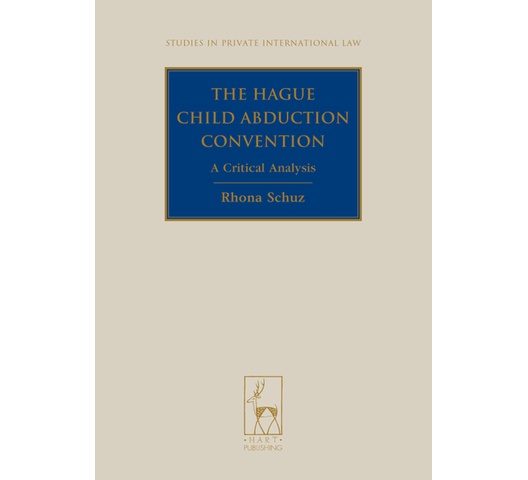
The Hague Child Abduction Convention
International child abduction is one of the most emotionally charged and fascinating areas of family law practice. The 1980 Hague Convention on the Civil Aspects of International Child Abduction was the response of the international community to the increase in the phenomenon of parental child abduction. However, behind the widely acclaimed success of this Convention - which has now been ratified by more than 90 states - lie personal tragedies, academic controversy and diplomatic tensions.
The continuing steady flow of case-law from the various Member States has resulted in the emergence of different approaches to the interpretation of key concepts in the Convention. In addition, over the years other global and regional legal instruments and the recommendations of the Special Commissions have had an impact on the implementation of the Convention.
This book brings together all these strands and provides an up-to-date, clear and highly readable discussion of the international operation of the Abduction Convention together with in-depth critical academic analysis in light of the objectives of the Convention and other relevant legal norms, such as the 1989 UN Convention on the Rights of the Child. Throughout the book, examples are brought from case law in many jurisdictions and reference is made to relevant legal and social science literature and empirical research.
Over the past decade, increasing focus has been placed on what might be seen as procedural issues, such as separate representation for children, undertakings, judicial liaison and mediation. The book analyses the significance of these developments and the extent to which they can help resolve the continuing tension between some of the objectives of the Convention and the interests of individual children.
This book will be essential reading for judges, practitioners, researchers, students, policy-makers and others who are seeking a critical and informed analysis of the latest developments in international abduction law and practice.
From the Foreword by Brenda Hale, Justice of the Supreme Court of the United Kingdom
'This book is, as far as I am aware, the first scholarly monograph to study the interpretation and application of the Convention across the whole legal space which it occupies and to critically assess these in light of the object and purposes of the Convention and other relevant legal norms. Cases are drawn from many jurisdictions to discuss how different countries interpret the Convention and links are made with relevant statistical, social and psychological research in a thoughtful discussion of the significance of such material both to judicial decision-making and to policy development…a study which deserves to be read by anyone with an interest in the modern phenomenon of international child abduction, whether judge, practitioner, policy-maker, parent, researcher or scholar. There is plenty for us all to think about.'
The continuing steady flow of case-law from the various Member States has resulted in the emergence of different approaches to the interpretation of key concepts in the Convention. In addition, over the years other global and regional legal instruments and the recommendations of the Special Commissions have had an impact on the implementation of the Convention.
This book brings together all these strands and provides an up-to-date, clear and highly readable discussion of the international operation of the Abduction Convention together with in-depth critical academic analysis in light of the objectives of the Convention and other relevant legal norms, such as the 1989 UN Convention on the Rights of the Child. Throughout the book, examples are brought from case law in many jurisdictions and reference is made to relevant legal and social science literature and empirical research.
Over the past decade, increasing focus has been placed on what might be seen as procedural issues, such as separate representation for children, undertakings, judicial liaison and mediation. The book analyses the significance of these developments and the extent to which they can help resolve the continuing tension between some of the objectives of the Convention and the interests of individual children.
This book will be essential reading for judges, practitioners, researchers, students, policy-makers and others who are seeking a critical and informed analysis of the latest developments in international abduction law and practice.
From the Foreword by Brenda Hale, Justice of the Supreme Court of the United Kingdom
'This book is, as far as I am aware, the first scholarly monograph to study the interpretation and application of the Convention across the whole legal space which it occupies and to critically assess these in light of the object and purposes of the Convention and other relevant legal norms. Cases are drawn from many jurisdictions to discuss how different countries interpret the Convention and links are made with relevant statistical, social and psychological research in a thoughtful discussion of the significance of such material both to judicial decision-making and to policy development…a study which deserves to be read by anyone with an interest in the modern phenomenon of international child abduction, whether judge, practitioner, policy-maker, parent, researcher or scholar. There is plenty for us all to think about.'
KES 26,581

International delivery
Free click & collect
| UPC | 9781782253099 |
|---|---|
| Author | Rhona Schuz |
| Pages | 530 |
| Language | English |
| Format | EPUB |
| Publisher | Bloomsbury Publishing |
| SKU | 9781782253099 |
None

